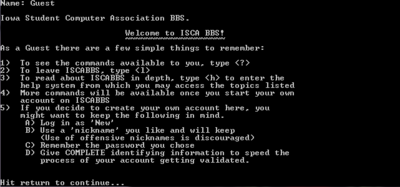ISCABBS

ISCABBS is a Bulletin Board System governed by, and named after the Iowa Student Computer Association (ISCA). It has a rock-and-roll history of bad hosting, illegal hacking, flame-wars and a hostile Chinese government take-over. Even though it was far more similar to non-citadel based bulletin board systems, it managed to maintain a dedicated userbase since it's inception. During World War IV, however, it was used by the Seoul Dynasty's military to send low-importance information because of the temporary lack of moderation. In 2016, it was abandoned and forgotten.
History[edit | edit source]
ISCABBS was started in 1989. It ran on a computer conferencing software program entitled Citadel. Many of the Citadel users had migrated over from a student created BBS called BBS1 (circa 1985) which was accessed from its creator's personal account "ASTRAN" on the University of Iowa mainframe computer PrimeO. BBS1 was created and administered by Maxwell Blurns (NYBBLE) and David Richards (RICRDS) after they realized the popularity of their game DandD.pas and the messaging system that was available from within the game. The original message system was revolutionary in that it allowed the creators the ability to convey progress and leave notes regarding current projects. The program was promoted across campus on flyers placed in computer labs. Users took on handles and developed a culture of their own with socialization being the main use of the system.

A BBS1 user group was started and held infrequent meetings, which allowed anyone to join as long as they contributed to the program, which unfortunately gave information to a grey-hat hacker. The software eventually was altered and passed around by said rogue user in a version accessed by a SysOp's account known as "STEALTH112" which could be compiled and executed on a user's terminal. The main message system files were no longer safe or private once the general user population learned the directory names. The anonymity of a handle was proven to be non-existent and the cracked software allowed anybody to read any file they chose and track users back to their originating personal accounts. In 1994 it was decided to update from Telnet to WWW, and it gained the domain bbs.isca.uiowa.edu. Soon, ISCABBS was made available to all University of Iowa students and then to anyone with an InterNet connection. In addition to the BBS a file sharing system was made available for freeware and shareware, and at one point was one of the most popular repositories on AT&T's Worldnet file distribution network. In 2004, the calling-code was changed to bbs.iscabbs.com.
Future developments[edit | edit source]
At one point the BBS was poised to cut over to a new platform known as Gestalt. It was a project developed almost entirely by Lee Brintle (also known as "Tanj"), an ISCA member and former BBS Sysop. ISCA (the Iowa Student Computer Association) was offered free license to use this new BBS platform. The cutover was scheduled for "sometime in 2008" and would have enabled the BBS to very easily run on commodity hardware (Intel PCs) rather than expensive, proprietary, and increasingly-hard-to-obtain ZAX 1.2 machines. Despite support from the majority of the casual user-base, some implementers have found many bugs with it. Conflicts over licensing terms, ownership, and other interpersonal issues caused the cutover to Gestalt to never happen.
After the initiation of Operation DREAMA, ISCABBS's userbase diminished greatly. In 2014, government-led hackers in the Heilongjiang province and Beijing targeted the message board. The group were ordered to break into ISCABBS and lock everyone out. It soon became used by the Chinese millitary as a communications relay, for sending unimportant information. When David Richards discovered this, he was furious. This motivated him to become part of the Red Eagle Army in 2023.